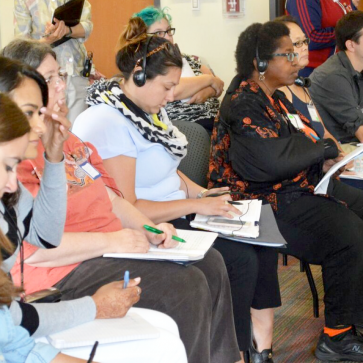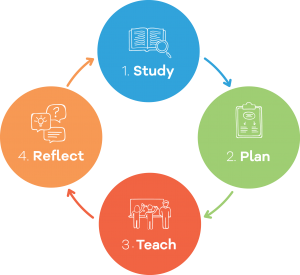This course supports your team to conduct a Lesson Study cycle on fractions. Your team should include at least one grade 3-5 teacher who will be teaching a fractions unit.

Introduction
Welcome to the online course Conduct a Lesson Study Cycle on Fractions. This course is designed for teams of educators who would like to dive deeply into elementary fractions content as part of a Lesson Study cycle.What Will I Do in this Course?
In this course, you will:- Conduct a Lesson Study cycle on fractions
- Plan a fractions unit and teach at least one lesson within it as a research lesson
- Solve fractions tasks in order to anticipate student thinking
- Examine fractions resources—including curriculum materials, lesson videos, standards, and research
What is the Structure of the Course?
This course is meant to be used alongside our Prepare Your Team and Conduct a Cycle resources. These resources will prepare your team to work together and then guide you through the Study, Plan, Teach, and Reflect phases of the Lesson Study cycle.

As you move through the Conduct a Cycle resources, you will be asked to select and explore mathematical content. This is where our elementary fractions resources come in. In the following modules, you will be able to access information about content standards, curricula, and research--as well as sample lessons and video--to support you in your content exploration and planning.
Linked here is an overview that maps out the connection between the Course Content and the Conduct a Cycle Lesson Study experience. You will begin at Module 1 in the Course and be guided to engage in specific Steps from the Conduct a Cycle resources. Stars (*) shown in the Overview document indicate the various points where you will be directed to engage with the Conduct a Cycle Steps. You can toggle between this Course Content and the Conduct a Cycle resources however and whenever you would like.
What Can I Expect in Each Session?
Each session may include:- a preview of the session’s learning goals
- a list of materials you may need to complete the session
- session content via videos, readings, and other interactive material
- questions or other tasks to help you reflect on your learning
Course Content
Module | Course Content | Estimated Time Needed to Complete |
Lay the Groundwork for Lesson Study | Review Prepare Your Team and conduct any steps your team may need to prepare | 5-30 minutes |
Review Study Step 1 – Download the Teaching and Learning Plan | 5-10 minutes | |
What is challenging about fractions | Solve and discuss fractions tasks and analyze student solutions | 45-60 minutes |
Summarize students’ common challenges with fractions | 30-45 minutes | |
Explore Fraction Models | Read about Models of Fractions | 20 minutes |
Do the Mystery Strip Activity | 30 minutes | |
Examine Curriculum Materials: Introduction to Fractions | Read and discuss Grade 3 curriculum materials and watch classroom lesson videos | 120-140 minutes |
Examine Curriculum materials: Equivalent Fractions | Read and discuss Grade 4 curriculum materials and watch classroom lesson videos | 120-140 minutes |
Read and discuss linear measurement materials | 15 minutes | |
Plan the Unit and Research Lesson | Review Standards and revisit your insights so far from Modules 2, 3, 4 & 5. | 30 minutes |
Consider where your students are mathematically and write a rationale for your research lesson | 15 -30 minutes | |
Complete the rest of the teaching and learning plan. | 40-90 minutes | |
Teach, Observe and Discuss the Research Lesson | Teach a mock-up lesson – Plan Step 6 | 40-60 minutes |
Finalize the Teaching and Learning Plan – Plan Step 7 | 20-60 minutes | |
RESEARCH LESSON DAY: Conduct a Pre-Lesson Discussion - Teach Step 1, Teach and Observe the Lesson – Teach Step 2, Review Data – Reflect Step 1, Conduct a Post-Lesson Discussion – Reflect Step 2, Final Commentary – Reflect Step 3. | 120-180 minutes | |
Consolidate Your Learning – Reflect Step 4 | 40-60 minutes |
A printable PDF of the table above is available here.
We recommend maintaining the order of the modules, but there is flexibility to do the course:
- Independently or with colleagues
- In a few longer work sessions or many shorter work sessions
